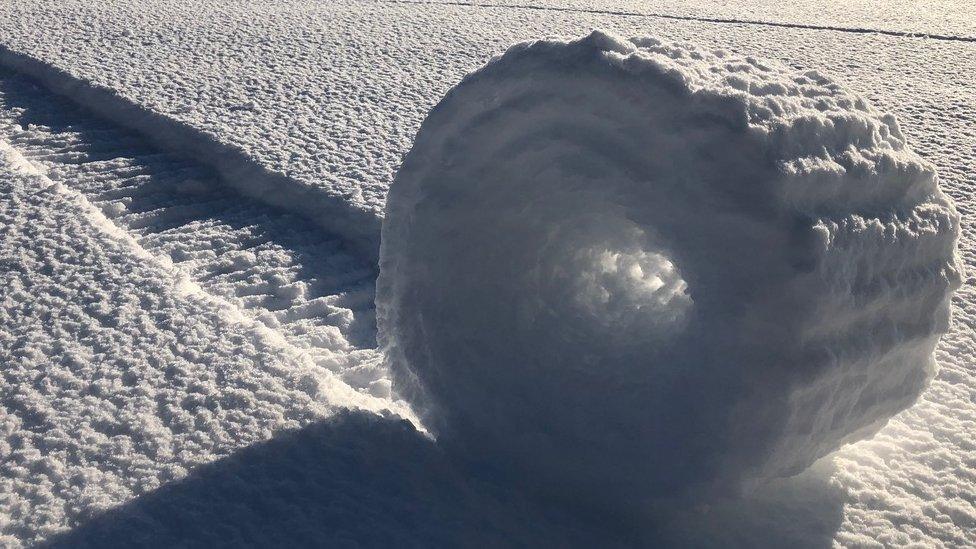Snowrollers and other amazing sights made by nature
- Published

Guess what? This giant snow bale wasn't made by a person playing in the snow! It is thought the bales formed on their own when wind conditions were perfect enough to blow chunks of snow along the ground. Six of these rare "snow rollers" were spotted by Brian Bayliss in Wiltshire.
You'd be forgiven for thinking this is a lake filled with strawberry milk! The cause of the flamingo-pink colouring of Lake Hillier in Australia remains a mystery. Some people believe that a reaction between natural salts, sodium bicarbonate and red halophilic bacteria are responsible for the bright pool of pink.
There really is such a thing as a desert rose! These sand sculptures form when dry and sandy places flood. The switching between wet and dry conditions lets crystals form between grains of sand, producing these unique floral shapes!
If you think this is a picture from the next big movie blockbuster, then you would be wrong. This is real life weather in action - it's volcanic lightning! Also known as a dirty thunderstorm.
Have you ever seen anything like this? A perfect circle of light forming in the sky! Halos happen when a bright light source - such as the sun or reflected light from the moon - shines through clouds made up of ice crystals. The ice crystals that the light shines through act like small prisms and mirrors, which refract and reflect light. Refraction can change the direction of light and can split it into different colours. The effect is similar to how rainbows are created.
That's not a snowy landscape, but a salty one! It's Salar de Uyuni in Bolivia, the world's largest salt flat, and was formed as a result of transformations between several ancient lakes. The wet season turns the flat into a huge reflective mirror which draws people from far and wide to marvel at its reflection.
This giant blazing hole in the middle of the desert in Turkmenistan is a natural gas field known as the 'Door to Hell'. The gas crater was set on fire by geologists to prevent the spread of methane gas. It has a total area of 5,350 m2, the size of an American football field!
Has a rainbow-coloured alien spaceship just crash landed on earth? Unfortunately not, but here is the Fly Geyser located in Nevada鈥檚 Black Rock Desert. The geological wonder was formed when human error and nature collided. It was once a man-made well which was abandoned, allowing mineral deposits to develop the various terraces that now surround the growing geyser. The breathtaking colours are due to thermophilic algae that thrives in the wet, hot conditions created by the geyser. Pretty cool!
Does this look a bit like a UFO to you? Well you wouldn't be the first to think so! This is a lenticular cloud and is formed when air moves over the top of hills or mountains. They usually form near mountain ranges or in hilly areas. As the wind cools it condenses and becomes a cloud, but lenticular clouds are different from other clouds in that they don't move in the sky. While the cloud stays in place, it is shaped by new air rising up, making the cloud smooth and round.
You might have heard of the Northern Lights, or Aurora Borealis, but did you know that they happen in the southern hemisphere as well? Southern Lights, known as Aurora Australis, are much rarer but just as spectacular.
- Published11 May 2018
- Published23 October 2018
- Published10 April 2018
